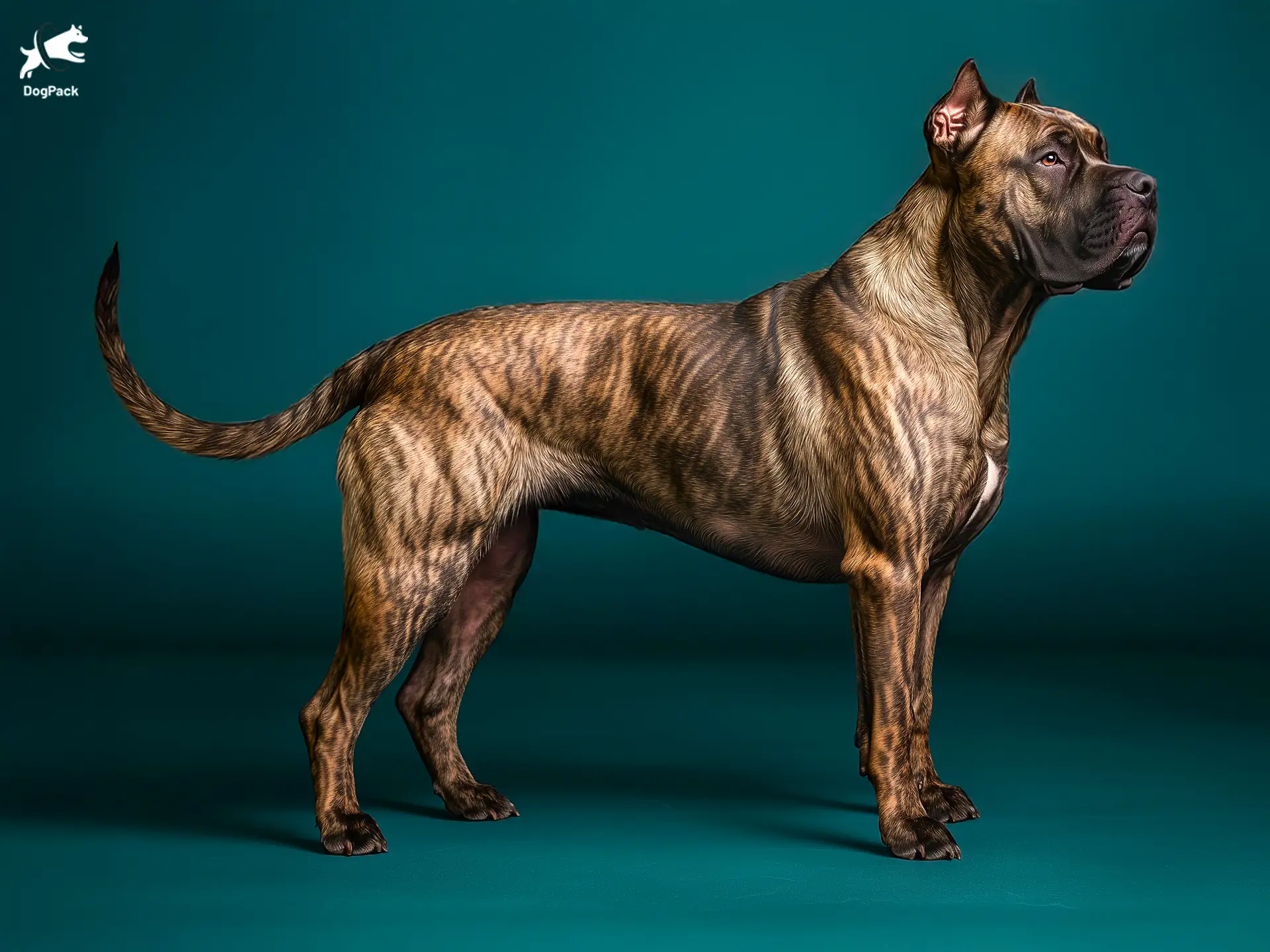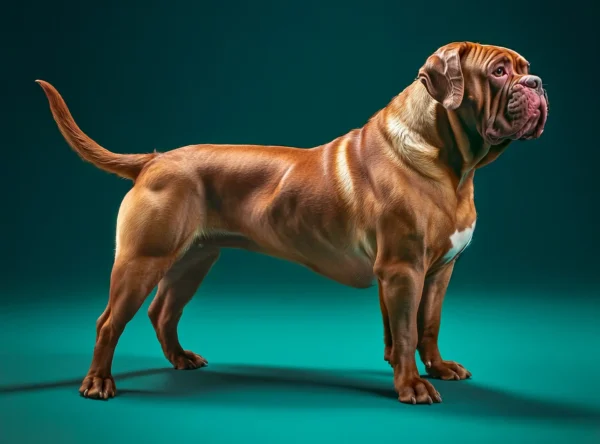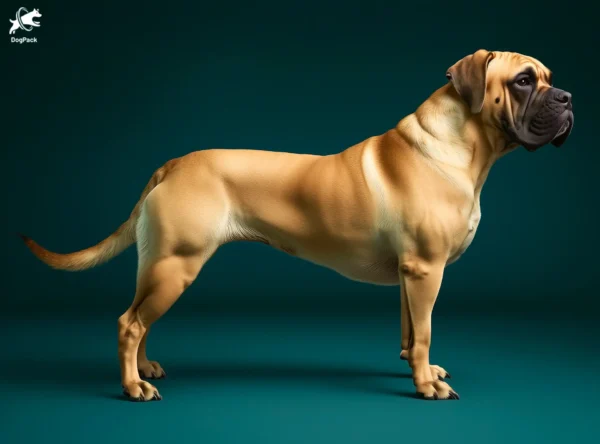Perro de Presa Canario Dog Breed Info & Overview
Often called the Canary Mastiff, this formidable canine is renowned for its striking presence and fearless nature. Muscular and agile, it’s prized as a hardworking guardian. Yet beyond its imposing look, the Perro de Presa Canario boasts a loyal spirit and a surprisingly gentle demeanor that makes it a reliable companion for the right home.
Characteristics
Pictures
Breed History
Ever heard of a dog so tough it practically moonlighted as a bouncer for livestock? That’s the Perro de Presa Canario for you. Originating from the Canary Islands—not the vacation-y postcard version, but the rugged, volcanic farmland—this breed was the farmer’s best friend and a four-legged fortress.
Descended from mastiff-type dogs brought by Spanish conquistadors, it quickly became the go-to guardian of farms, cattle, and homes. This wasn’t your average sleepy watchdog either—Presas were bred to handle wild predators, unruly bulls, and maybe even nosy neighbors.
By the mid-20th century, the breed nearly vanished due to a ban on dog fighting and the rise of foreign breeds. But fans of the Presa weren’t giving up that easily. A revival effort in the 1980s brought them back, and now, they’re once again a living legend in their homeland and beyond.
Temperament, Personality
The Perro de Presa Canario is kind of like the bodyguard who secretly writes poetry. Stoic and watchful on the outside, but once you’re part of the family, you’ve got a shadow that adores you—sometimes a little too closely.
With kids, it can be incredibly gentle, as long as boundaries are clear and supervision is a given. This is not a “set it and forget it” breed around toddlers; think more along the lines of “parent-led playdate with built-in security detail.”
Other pets? It depends on how early introductions happen and how much mutual respect exists. A Presa raised with other dogs might be chill. A Presa meeting a new dog at the park? Let’s just say you’ll want to have strong leash control and an escape plan.
Physical Characteristics
Muscles on muscles—that’s the Perro de Presa Canario’s default look. This dog doesn’t just enter a room; it dominates the space. With a blocky head, thick neck, and wide-set frame, it gives off strong “do not mess with my humans” energy.
The coat is short and feels a bit coarse to the touch, like fine-grade sandpaper. Brindle is the showstopper here, but you’ll also see fawn, black, and sometimes a striking silver hue that catches the light like armor.
What’s especially captivating is the expression—serious, thoughtful, and always on alert. That broad jawline? Perfect for tug-of-war. The wide chest and sturdy legs? Built for holding ground, literally and figuratively.
Health Issues
Big, bold, and beautiful often comes with some baggage, and for the Presa Canario, that means watching for orthopedic issues like hip and elbow dysplasia. If your dog starts bunny-hopping like it’s in a weird dog Olympics, time to call the vet.
Their deep chest makes them prime candidates for bloat—an emergency that can turn deadly fast. Avoid big meals before zoomies, and skip the post-dinner fetch game. This isn’t the breed to test fate with digestion.
Also, those intense eyes? Sometimes prone to conditions like entropion. Keep an eye out (pun intended) for squinting or discharge. Regular vet checkups can save you from surprise surgeries and unwanted stress.
Grooming Needs
Good news: the Presa Canario won’t turn your home into a snow globe of fur. Their short, dense coat sheds moderately but doesn’t mat. A weekly brushing session with a rubber mitt or grooming glove should do the trick—bonus points if it doubles as bonding time.
Baths? Only when they start to smell more “barnyard bouncer” than “dignified companion.” Use a gentle shampoo that won’t strip their natural oils, and focus on drying those folds and crevices thoroughly afterward.
Ears can be a sneaky hiding place for gunk, especially if cropped. Regular checks prevent infections. Add in nail trims and the occasional dental treat, and you’ve got yourself a low-maintenance grooming routine that still keeps your Presa looking polished.
Exercise Requirements
Think of this breed as a bodybuilder with a brain—it needs both physical and mental stimulation to stay balanced. A couple of brisk walks a day? Great start. Add in some fetch, flirt pole workouts, or even light weight-pulling, and you’ve got a happy dog.
Without exercise, you may discover your Presa has a knack for DIY landscaping or interior “redecorating.” Trust us, your flowerbeds and couch cushions will thank you for keeping them active.
A securely fenced yard is gold, but not a substitute for structured activity. These dogs want a job—or at least the illusion of one. Training games, puzzle feeders, and social walks can go a long way toward preventing cabin fever.
Training Tips
Training a Perro de Presa Canario isn’t for the faint-hearted or the soft-spoken. These dogs are independent thinkers who thrive when they respect their human, not when they’re forced into submission. Confidence and consistency are key—think dog trainer with CEO energy.
Start early and stay firm but fair. Obedience classes with breed-savvy instructors can help set the tone. This breed responds well to positive reinforcement, but don’t confuse “positive” with “pushover.”
Be especially vigilant with leash manners and impulse control. A full-grown Presa dragging you down the street isn’t a vibe. Structured sessions, clear expectations, and plenty of praise build a respectful relationship that lasts.
Nutrition, Diet
You can’t fuel a tank with orange juice—and you can’t feed this muscular beast with average kibble. A mature Perro de Presa Canario, especially one weighing 100–130 lbs, will typically need 2,200–2,800 calories per day, split into two solid meals.
Opt for high-protein, grain-inclusive formulas with glucosamine for joint support. Raw feeders often swear by lean beef, green tripe, and meaty bones a few times a week for muscle tone and dental health.
Skip foods heavy in fillers, corn, or soy. This breed thrives on clean, nutrient-dense diets, not supermarket bargain bags. Bonus: supplements like fish oil or turmeric can reduce inflammation and keep joints purring (well, metaphorically).
Adoption, Breeders
Thinking of bringing home a Presa? Start by checking out the Presa Canario Club of America for reputable breeders and detailed standards. You can also search Adopt-a-Pet to see if any rescues near you have a Presa looking for a second shot.
When buying, ask about elbow and hip scoring, temperament testing, and the dog’s early socialization. A breeder worth their salt will gladly share documentation and introduce you to the dam and sire.
Adopting an adult? Many former working dogs adjust beautifully with firm guidance and time. Whether pup or pro, be ready for commitment—this isn’t a “see how it goes” kind of breed.
Family Pet?
The Perro de Presa Canario can be a big ol’ teddy bear with its inner circle—but a teddy bear that could wrestle a mountain lion. With proper training and strong boundaries, it bonds deeply with family, especially when raised alongside respectful kids.
Small children should always be supervised. Not because the dog is dangerous, but because it weighs more than your average fourth grader and doesn’t always know its own strength.
Cats and smaller pets? Maybe—with early exposure and careful management. Presas tend to be selective about their company. Think curated friend list, not everyone-is-invited BBQ.
Right For You?
This breed isn’t for everyone, and that’s okay. It thrives with owners who understand working dogs and know how to lead without dominating. If you’re calm, confident, and consistent, you’re already halfway there.
Apartment life? Not ideal. A bored Presa in a tiny space is just a fur-covered wrecking ball. Ideally, they have space to move, tasks to perform, and people who take their role seriously.
But if you’re the type who loves purposeful breeds and doesn’t mind a little extra effort for a whole lot of loyalty, this might just be your four-legged soulmate. Just don’t expect couch-potato energy—it’s not in their DNA.
Conclusion
The Perro de Presa Canario is a bold, loyal powerhouse that thrives with structure, purpose, and a family it can protect. For the right owner, it offers fierce devotion and unmatched presence. If you’ve got the leadership, time, and heart to match this breed’s intensity, you’ll gain a companion who’s as solid in love as it is in muscle.
FAQs
-
What’s the difference between a Perro de Presa Canario and a Dogo Canario?
The Perro de Presa Canario and Dogo Canario are the same breed; “Dogo Canario” is the official FCI name, while “Presa Canario” is commonly used in Spain and the U.S. Both refer to the muscular working mastiff from the Canary Islands.
-
Can a Perro de Presa Canario be trained for personal protection work?
Yes, the Perro de Presa Canario excels in personal protection due to its natural guarding instincts, strong nerves, and loyalty. However, it requires a skilled handler and professional training to safely channel its power and drive.
-
Why does the Perro de Presa Canario have cropped ears in some countries?
Some breeders crop the Presa Canario’s ears for traditional or working purposes—historically to prevent injury during guarding or dog-on-dog conflict. In many countries, this practice is banned or discouraged due to ethical concerns.
-
Does the Presa Canario have a strong territorial instinct indoors?
Yes, the Perro de Presa Canario is highly territorial, often guarding doors, gates, or specific rooms. It may position itself between guests and family. Socialization helps manage this behavior, but its natural protectiveness is a core trait.
-
Is the Perro de Presa Canario legal everywhere in the U.S.?
No, the Presa Canario is restricted or banned in some U.S. municipalities due to its strength and past misuse. Always check local breed-specific legislation (BSL) before bringing one home, as ownership rules vary by state and city.
Breed Ratings
The Perro de Presa Canario is quick to learn commands, especially when training is consistent and positive.
It enjoys playful activities but tends to be more serious than overly rambunctious, focusing on tasks.
While not hyperactive, this breed needs regular exercise to stay happy and healthy.
Short-coated but sheds moderately, requiring weekly brushing to reduce loose hair.
Can have a moderate prey drive, especially around small animals, if not socialized from puppyhood.
A short coat makes grooming relatively simple, requiring minimal effort.
Trainable but can be stubborn; a firm yet patient approach yields the best results.
Prefers human companionship; prolonged isolation may lead to anxiety or destructive behavior.
Typically quiet unless alerted to perceived threats or strangers.
Moderate drooler, particularly when excited or after drinking water.
With careful socialization, it can get along with other dogs, but caution is needed with unfamiliar canines.
Generally robust but susceptible to joint and eye issues that require monitoring.













